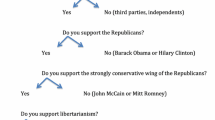Abstract
In this paper the argument from coherence is submitted to a critical analysis. First, it is argued to be a complex form of coordinative argumentation, structured on various argumentative levels. Then, using the pragma-dialectical theory of argumentation a distinction is brought out between two basic forms of the argument from coherence: in one use this argument occurs as a sequence of two symptomatic arguments; in the other use we have a main symptomatic argument supported by a subordinate pragmatic argument. Finally, from an evaluative point of view it is assessed whether the argument from coherence can be found acceptable as a tool for settling disputes. It is claimed that in general, we can welcome this argumentative structure as sound and fully acceptable provided that we are aware of the interpretative discretion its use implies.
Similar content being viewed by others
References
R. Alexy A. Peczenik (1990) ArticleTitle‘The Concept of Coherence and its Significance for Discursive Rationality’ Ratio Juris 3 130–147
R. Alexy (1998) ‘Coherence and Argumentation or the Genuine Twin Criterialess Super Criterion’ A. Aarnio (Eds) et al. On Coherence Theory of Law Juristfoerlaget Lund 41–49
R. Alexy (2002) A Theory of Constitutional Rights (1986) Oxford University Press Oxford
Z. N. Bańkowski N. MacCormick (1991) ‘Statutory Interpretation in the United Kingdom’ N MacCormick R Summers (Eds) Interpreting Statutes Dartmouth Aldershot
R. Dworkin (1986) Law’s Empire Fontana London
F. Eemeren Particlevan R. Grootendorst (1984) Speech Acts in Argumentative Discussions Foris Dordrecht
F. Eemeren Particlevan R. Grootendorst (1987) ArticleTitle‘Fallacies in Pragma-Dialectical Perspective’ Argumentation 1 283–301 Occurrence Handle10.1007/BF00136779
F. Eemeren Particlevan R. Grootendorst (1988) ArticleTitle‘Rationale for a Pragma-Dialectical Perspective’ Argumentation 2 271–291
F. Eemeren Particlevan R. Grootendorst (1992) Argumentation, Communication and Fallacies. A Pragma-Dialectical Perspective Erlbaum Hilllsdale NJ
J. Hage (2004) ArticleTitle‘Law and Coherence’ Ratio Juris 17 87–105. Occurrence Handle10.1111/j.0952-1917.2004.00257.x
K. Kress (1999) ‘Coherence’ D. Patterson (Eds) A Company to Philosophy of Law and Legal Theory Blackwell Oxford 533–552
B. Levenbook (1984) ArticleTitle‘The Role of Coherence in Legal Reasoning’ Law and Philosophy 3 355–374. Occurrence Handle10.1007/BF00654833
MacCormick, N.: 1983, ‘On Legal Decision and Their Consequences: From Dewey to Dworkin’, New York University Law Review, 239–258.
N. MacCormick (1984) ‘Coherence in Legal Justification’ A. Peczenik (Eds) Theory of Legal Science Reidel Dordrecht 235–251
N. MacCormick (1994) Legal Reasoning and Legal Theory (1978) Clarendon Oxford
MacCormick, N., Summers, R. (eds.): 1991 Interpreting Statutes, Dartmouth Aldershot.
N. MacCormick R. Summers (1991) ‘Interpretation and Justification’ N MacCormick R Summers (Eds) Interpreting Statutes Dartmouth Aldershot 511–544
A. Peczenik (1989) On Law and Reason Reidel Dordrecht
A. Peczenik (1990) ‘Coherence, Truth and Rightness in the Law’ P. Nerhot (Eds) Law, Interpretation and Reality Kluwer Dordrecht 275–309
J. Raz (1994) ‘The Relevance of Coherence’ J. Raz (Eds) Ethics in the Public Domain. Essays in the Morality of Law and Politics Clarendon Oxford 277–325
V. Rodriguez-Blanco (2001) ArticleTitle‘A Revision of the Constitutive and Epistemic Coherence Theories of Law’ Ratio Juris 14 212–232. Occurrence Handle10.1111/1467-9337.00178
Tarello, G.: 1980, L’interpretazione della legge, pp. 369–370, Giuffrè, Milan.
V. Villa (1990) ‘Normative Coherence and Epistemological Presuppositions of Justification’ P. Nerhot (Eds) Law, Interpretation and Reality Kluwer Dordrecht 431–455
G. Zaccaria (1990) ‘Hermeneutics and Narrative Comprehension’ P. Nerhot (Eds) Law, Interpretation and Reality Kluwer Dordrecht 251–274
Author information
Authors and Affiliations
Corresponding author
Additional information
A preliminary version of this essay was presented at the symposium organised by the Department of Speech Communication, Argumentation Theory, and Rhetoric at the University of Amsterdamon the 27/02/04. I wish to express my indebtedness to Dora Achourioti, Francesco Belvisi, Frans van Eemeren, Eveline Feteris, Bart Garssen, Jean Wagemans, Peter Houtlosser, and Henrike Jansen for their helpful remarks. Needless to say, the responsibility for the views expressed herein as well as for any errors of form or content rests solely with me.
Rights and permissions
About this article
Cite this article
Bertea, S. Does Arguing from Coherence Make Sense?. Argumentation 19, 433–446 (2005). https://doi.org/10.1007/s10503-005-0510-2
Published:
Issue Date:
DOI: https://doi.org/10.1007/s10503-005-0510-2




